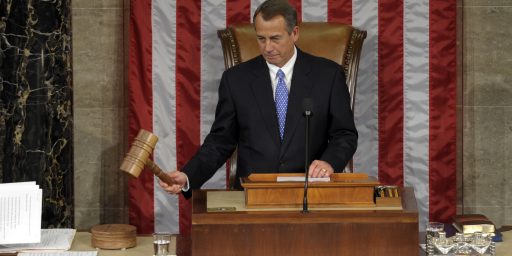Congress and Libya
Is Congress set to vote to authorize military action in Libya?
 Two stories on Congress and Libya that are worth noting:
Two stories on Congress and Libya that are worth noting:
1) Via Politico: John McCain, John Kerry introduce Libya resolution
“The Senate has been silent for too long on U.S. military operations in Libya,” McCain said on the chamber floor.
“It is time for the Senate to act. It is time to authorize the president’s use of force, whether he thinks he needs it or not. And it is time to send a message to our allies, to [Muammar Qadhafi] and to his opponents in Libya who are fighting for their freedom that there is strong bipartisan support in the Senate, and among the American people, for staying the course in Libya until we succeed.”
The joint resolution comes amid a fierce debate on Capitol Hill over whether Obama needs congressional approval to continue support operations for the NATO-led campaign against the Libyan dictator’s regime.
2) Via the Hill: House to vote on authorizing or ending Libya mission
Speaker John Boehner (R-Ohio) plans to introduce two Libya measures that present House lawmakers with a stark choice: Vote to authorize the U.S. combat mission or vote to end it.
House Republicans will discuss the proposals at a conference meeting Wednesday morning, and votes could occur on both by the end of the week.
One resolution would mirror a version proposed Tuesday by Sens. John Kerry (D-Mass.) and John McCain (R-Ariz.) that authorizes a limited U.S. military mission for one year, but prohibits the use of ground troops except to defend American officials in danger. The other resolution, Boehner said, would remove U.S. forces from Libya under the War Powers Resolution “except for forces engaged in non-hostile actions such as search & rescue, aerial re-fueling, operational planning, intelligence/surveillance/reconnaissance, and non-combat missions.”
The overall situation is interesting insofar as it demonstrates the likelihood that Obama could have gotten Congressional approval in the first place, had he simply sought it (especially if one is looking at the bipartisan support that appears to exist in the Senate). It also shows that lot of the criticism and hand-wringing from both the left and the right were for naught.
Granted, there has been no vote as yet, but the history of such things tends to suggest that the President will get his way. Indeed, even with partisanship at extremely high levels in Washington at the moment, it seems unlikely that the House would actually vote to call on the President to halt an ongoing military action. Indeed, such an act would be historic in scope. Of course, even if the House did pass such a resolution, it is highly unlikely to pass the Senate. As such, it would be odd for the House to engage in an action that would have the net effect of making the institution of Congress look weak vis-a-vis the executive (as it would be the Senate rebuking the House in an inter-branch conflict)—especially since I cannot see any political gain in such a move.
One thing in particular that is striking here is that at least some members of Congress appear to be willing to initiate this process in a way that, rather than truly being a case of Congress asserting itself, comes across more as a desperate attempt by the Congress to demonstrate its relevance in the situation. Because, to date (and despite various criticism, most of which are fair) it is pretty clear that the President is getting what he wants in regards to Libya without bothering with Congress, War Powers Act or no. Indeed, it is telling that instead of seeking to reign in the President, it would appear that the likely outcome (or so I think at the moment) is for Congress to affirm what the President is doing (which has the perverse effect of showing Congress’ weakness on the issue).





I’m so torn, part of me wants to side with the Neocons, but that means giving up a chance to bash Obama. Do I play politics, or do what’s best for the country?